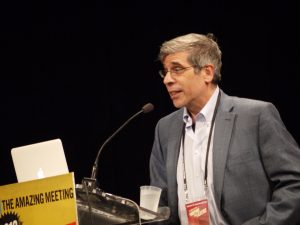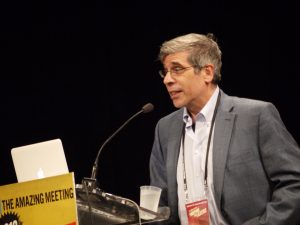Theologian and commentator Os Guiness has remarked that the only unanswerable objection to Christianity is Christians. It’s a fair point: it’s difficult to reconcile inquisitions and crusades with the Gospel of Jesus Christ. And while those atrocities are distanced from us in time, the scandal about sex abuse by Catholic priests in Pennsylvania is not.
This brings the objection to Christian belief from Christian behaviour into sharp focus. We’ve had harsh words for Jerry Coyne’s critique of Christianity in the past. But it is very difficult to find a swift, sharp refutation to his recent posting:
“I really don’t know how, after these revelations, which extend to high levels in the Church, one can remain a Catholic—a member of this organization.”
 In fact, Coyne should be commended for this particular post. He avoids triumphalism and spares readers from the most disturbing allegations. He does not choose to twist the knife, and does not condemn members of the Catholic church; he simply wonders how anyone could stay loyal to such an organisation. Now, I imagine that many Roman Catholics would reply that they are loyal to Christ’s presence in the sacraments and not the Church hierarchy. The Church is much more than an “organisation” or “association” in their minds.
In fact, Coyne should be commended for this particular post. He avoids triumphalism and spares readers from the most disturbing allegations. He does not choose to twist the knife, and does not condemn members of the Catholic church; he simply wonders how anyone could stay loyal to such an organisation. Now, I imagine that many Roman Catholics would reply that they are loyal to Christ’s presence in the sacraments and not the Church hierarchy. The Church is much more than an “organisation” or “association” in their minds.
Personally, I could try to dodge Coyne’s critique by stating that I am an evangelical Christian. I believe Roman Catholicism misrepresents the nature of the Church and I have deep reservations about the authority of the Church magisterium. But I don’t think that it is so easy dodge Coyne’s concerns.
…I can barely think of a religion (perhaps Quakers?) in which religious power has not led to rape and sexual abuse—mistreatment that wouldn’t have occurred in the absence of the cloak of sanctity covering church officials.
His argument seems a simple one. Religious organisations create power imbalances which enable abusers. Furthermore, religious power can cover a multitude of sins; so that power will attract predators who wish to have their sins covered. Finally, because human beings will normally strive to maintain power, religious organisations will be motivated to protect predators when exposure would damage the organisation.
The scandal does not challenge any particular Christian doctrine. Given my belief in each human being’s capacity for incredible wickedness, I am appalled and furious, but not surprised when humans connive in perversion and cruelty. Unfortunately, I am even less surprised when respectable individuals look the other way – and even conspire to cover up terrible crimes – when it is more convenient for them to do so.
 But shouldn’t I be surprised to find evil in a religious organisation? Not at all. Much of Jesus’ teaching warns of the dangers of religiosity. In the ‘Parable of the Good Samaritan’ it is the priest and the Levite who walk by a neighbour in desperate need, placing the institution of the Temple above the demands of compassion. Religious authorities conspired, and one of Jesus’ closest followers, to kill Jesus. Jesus warned that many people who professed to follow him would be wolves in sheep’s clothing. He believed that some of his most vocal supporters would one day be judged severely.
But shouldn’t I be surprised to find evil in a religious organisation? Not at all. Much of Jesus’ teaching warns of the dangers of religiosity. In the ‘Parable of the Good Samaritan’ it is the priest and the Levite who walk by a neighbour in desperate need, placing the institution of the Temple above the demands of compassion. Religious authorities conspired, and one of Jesus’ closest followers, to kill Jesus. Jesus warned that many people who professed to follow him would be wolves in sheep’s clothing. He believed that some of his most vocal supporters would one day be judged severely.
Jesus followed the prophetic tradition which taught that religiosity is not merely useless – it is potentially hazardous. In every human being there are two conflicting forces. We all have a deep, indelible knowledge of good and evil. On some level, we all value what is good: at the very least, we want to be regarded as good by our neighbours. But we also possess a hunger for power and a lust for experience. We often prefer to follow the latter desires – especially if we can do so while retaining our reputations as good people.
Religiosity did not merely provide the predators in Pennsylvania with cover and protection; it even gave them a veneer of outward respectability. Bishops and cardinals were reluctant to jeopardise their careers in an institution which provided them with both status and security. In their case, religiosity became an excuse for a selfish, callous, disregard for human suffering. In their own minds they were not cowards but merely acting to protect a greater good.
Such hypocrisy is not merely contemptible; it is dangerous. This is why Paul argues at length that religious deeds justify no-one. It is why the psalmist and the prophets make it clear that God prefers mercy to sacrifice; and why Jesus stressed that even the devout require forgiveness. In fact, Jesus taught that no-one can enter the Kingdom without being transformed by Him. Citizens of the Kingdom should be characterised by patience, mercy, forgiveness, gentleness, self-control, compassion and kindness. Those who cannot comprehend the value of mercy have never truly accepted God’s mercy.
But it will not do to argue that the abusers and their enablers were not true Christians. The problem is that true Christians can create a context in which predators can survive – or even flourish. Again, the problem is that religious organisations can accrue the power necessary to conceal vicious criminality; therefore persons with vicious intent will be attracted to such institutions. Worse, religiosity can salve the consciences of cowards, degenerates and crooks. We want to justify ourselves in our own eyes, and religion can be a helpful means to that end.
None of this is based on secular critique of religious institutions; it flows from ethical teachings in both testaments. The problem is not one of intellectual coherence; it is rather a practical challenge. It is true that power imbalances correlate with abusive relationships. Therefore, I think that it is prudent for the church to accumulate as little political and financial power as possible. Bureaucracy should be restricted as far is possible.
Churches must continually be reminded that it is the responsibility of the state to protect society from criminality; the prevention of crime is a secular matter. Therefore Christian denominations ought to have the humility to learn from secular organisations who campaign against child abuse.
Elsewhere, I have argued that there is a strong case for religious freedom. But if religious organisations – and similar groups – are to benefit from certain legal protections, perhaps they ought to take on extra responsibilities. I’ve argued that religions have a peculiar power to motivate individuals. Furthermore, religion is at the core of many people’s identity. So the abuse of religious power seems particularly dangerous. That being so, I would argue that the state should add penalties when a person uses religion to perpetrate or to cover up certain criminal acts.
 I believe that warnings about the dangers of religious power are apt. But power imbalances naturally occur when any human community is formed. Furthermore, secular organisations step into the vacuum left by the retreat of religious authorities. For example, the entertainment industry and the arts community seem to have developed quasi-religious sense of mission. Many political activists are possessed by a dogmatic certainty that would give fundamentalists a moment’s pause.
I believe that warnings about the dangers of religious power are apt. But power imbalances naturally occur when any human community is formed. Furthermore, secular organisations step into the vacuum left by the retreat of religious authorities. For example, the entertainment industry and the arts community seem to have developed quasi-religious sense of mission. Many political activists are possessed by a dogmatic certainty that would give fundamentalists a moment’s pause.
In other words, we could wipe every Christian denomination from the face of the Earth and the problems encountered in Pennsylvania could re-emerge. Other communities with grand moral visions would simply step into the gap left by the church; and the evidence is that they would also shelter abusers and criminals. I cannot see a case for leaving Christian denominations, still less a local church. But naivety is not an option; wolves will always seek to infiltrate God’s flock. When we are not alert to the danger we place innocents in jeopardy; and we provide sceptics with an objection which is practically impossible to answer.

